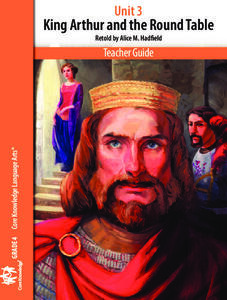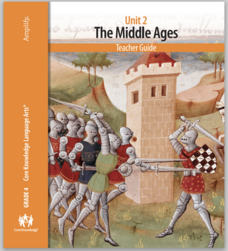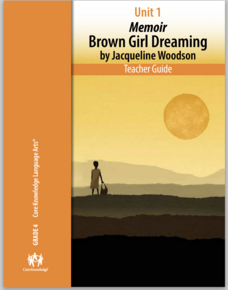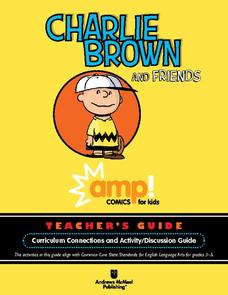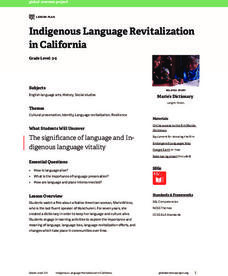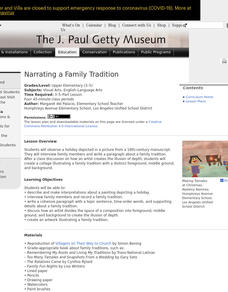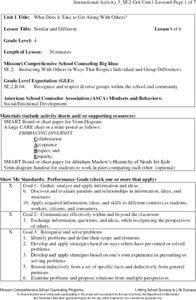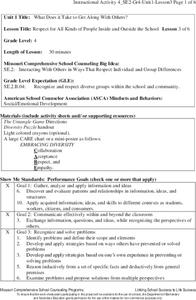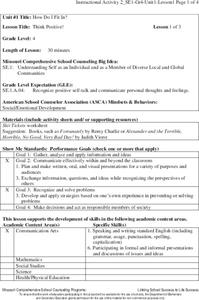Core Knowledge Foundation
Unit 6: American Revolution
The American Revolution is the theme of a five-week unit that focuses on reading, grammar, morphology, and writing. Scholars read and respond to texts, practice spelling and word work, and write paragraphs. Assessments gauge comprehension.
Core Knowledge Foundation
Unit 3: King Arthur and the Round Table
Over four weeks, fourth graders study King Arthur and the Round Table, retold by Alice M. Hadfield. Fifteen lessons take pupils through each chapter, complete word work, and the writing process to draft paragraphs, sentences, dialogue,...
Core Knowledge Foundation
Unit 2: The Middle Ages
Over four weeks, fourth graders read and discuss texts about the Middle Ages. They practice vocabulary, spelling, and grammar, such as nouns, adjectives, and verbs. Writing opportunities allow learners to boost their note-taking skills...
Core Knowledge Foundation
Unit 1: Memoir - Brown Girl Dreaming by Jacqueline Woodson
The memoir, Brown Girl Dreaming by Jacqueline Woodson, is the focus of a unit designed for fourth graders. Scholars begin each lesson with a warm-up, then listen to a read-aloud of a section of the book. Pupils complete word work,...
Humane Education Advocates Reaching Teachers
Justice for All - Educating Youth for Social Responsibility: Grades K-5
In grades kindergarten through fifth grade, scholars take part in a social-emotional learning unit designed to boost social responsibility. Three hundred pages provide lessons and activities related to everyday classroom practices, the...
GLSEN, Inc.
Ready, Set, Respect!
Instill the importance of respect in your classroom with a comprehensive unit that focuses on positive behavior in and outside of school. Three parts, each separated into four grade-specific lessons, cover bullying, bias, name-calling,...
ReadWriteThink
Literature Circles: Getting Started
Make reading more enjoyable and interactive with literature circles! Here you'll find detailed lessons to begin the literature circle process. Ten lessons introduce each role learners take on. Literature circle roles include...
Common Sense Media
Talking Safely Online
What is the difference between online and real-life friendships? Pupils learn how to keep information private online and maintain their safety in various situations requiring online communication.
Common Sense Media
Digital Citizenship Pledge
Learners collaborate to create a set of group norms and expectations by which they will abide in order to promote a safe, respectful online community.
Social Skills Central
Ready, Set, Respond!
When faced with a difficult situation, do you respond selfishly, face it head on, or ignore the problem? This game encourages learners to evaluate the wide range of reactions we can have to problematic situations, and how our responses...
Andrews McMeel Publishing
Charlie Brown and Friends
Charles Schulz' Charlie Brown and Friends, a collection of Peanuts comic strips, provides young readers with an opportunity to engage in full-class discussions, work in groups to examine how Schulz develops his characters, and...
NASA
Soda Straw Rockets
Three, two, one, blast off to a better understanding of force and motion with this exciting science lesson! Beginning with a discussion about rockets and gravity, young scientists go on to complete a series of worksheets about net...
Pfizer
Stress Lessons Toolkit
A unit plan that is over 50 pages in length offers lessons and activities that define stress, practice breathing techniques, bring awareness to triggers, refocus worries and fears, and offer practical problem-solving strategies. The unit...
Global Oneness Project
Indigenous Language Revitalization in California
A film showcases a Native American woman and her hard work to create a dictionary detailing her tribe's language. While viewing, scholars reflect upon and discuss the importance of language and sustaining cultural identity.
J. Paul Getty Trust
Narrating a Family Tradition
After examining a piece of art, scholars discuss what they see, paying close attention to details and space. A read-aloud introduces the topic of family traditions. Pupils interview their family members about a tradition in preparation...
Teaching Tolerance
Privacy and Security Online
Don't forget to dust for digital footprints! Scholars engage in a whole-class discussion about how digital footprints compromise online safety and privacy. Next, small groups create posters to illustrate what it looks like to follow...
Teaching Tolerance
Activism Online
People can make a difference in the world without leaving their homes. Using an eye-opening resource, scholars complete a handout as they consider the strengths and weaknesses of the Internet as a tool for social activism. Finally,...
Teaching Tolerance
Sensible Consumers
Girls like pink and boys like blue. Working in small groups, learners discuss stereotypes about children in advertisements. Then, scholars create their own manifestos about how they plan to respond to the consumer market they see in...
Teaching Tolerance
Participating in Digital Communities
It's possible to promote inclusion and empathy on the Internet—it just takes effort! Scholars read and discuss a short story about being a friend online. Then, pupils role-play appropriate ways to respond to hate within a digital...
Teaching Tolerance
Oral History Project
Get up-close-and-personal with history using guidance for an oral history project. An engaging resource takes pupils through brainstorming through feedback for a project to interview and collect oral histories from members of their...
Missouri Department of Elementary
Similar and Different
Using a Venn diagram, pupils compare the similarities and differences between two classmates. Next, they review the CARE acronym (Collaboration, Acceptance, Respect, Empathy) and discuss how it applies to diversity in the classroom.
Missouri Department of Elementary
Respect for All Kinds of People Inside and Outside the School
Why is it important to embrace diversity? Scholars explore the topic by learning about the CARE acronym: Collaboration, Acceptance, Respect, Empathy. They also complete a diversity puzzle worksheet and play a collaborative game that...
Missouri Department of Elementary
Think Positive!
Following an attention-grabbing read-aloud, scholars brainstorm ways they can change negative thoughts into positive thoughts. Small groups plan and perform a skit that showcases one of the new ideas to uplift one's feelings....
Missouri Department of Elementary
I’m A Star!
A lesson encourages scholars to be star community members. Pupils take part in a class discussion that challenges them to brainstorm at least two ways to show responsibility within one's community. Small groups play a game in which...



